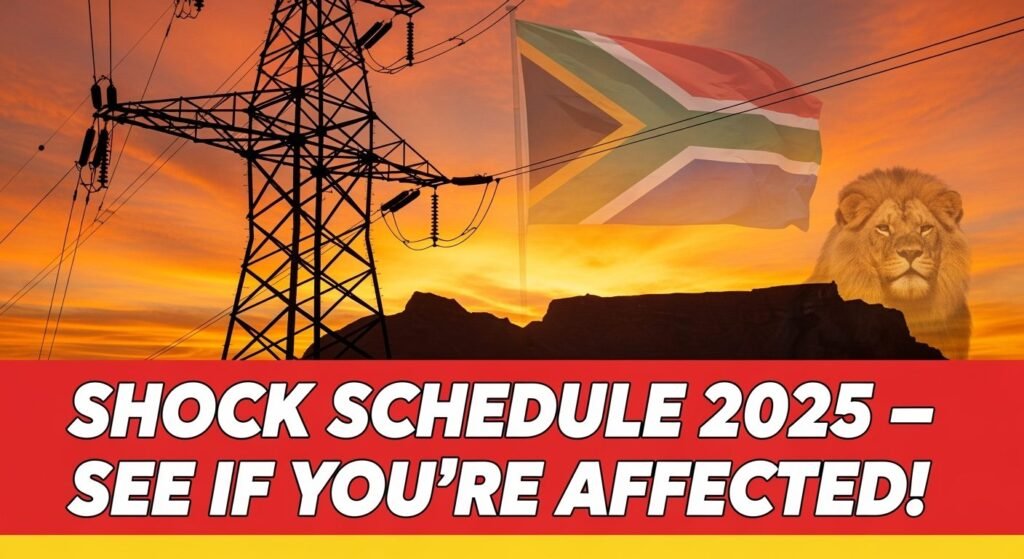Eskom Load Shedding Schedule: I’ve just received the latest update that South Africans need to prepare for another challenging month ahead. Eskom has officially released its September 2025 load shedding schedule, and it looks like we’re in for some significant power disruptions across the country. The national power utility has warned citizens to brace themselves as the schedule indicates more frequent and potentially longer outages compared to previous months. Have you started planning how your household or business will cope with these upcoming power cuts? The newly released schedule shows a concerning pattern of increased load shedding hours, particularly during peak evening times.

What the September 2025 Load Shedding Schedule Entails
The September 2025 load shedding schedule released by Eskom reveals a structured approach to power cuts across different regions. According to the official announcement, most areas will experience Stage 2 to Stage 4 load shedding throughout the month, with some regions potentially facing Stage 5 during critical periods. The schedule indicates that weekday evenings between 5 PM and 10 PM will be most affected, with additional morning slots between 6 AM and 9 AM also designated for power cuts. Eskom has cited ongoing maintenance at several major power stations and seasonal demand increases as primary factors behind the intensified schedule.
I’ve noticed that the schedule also includes specific dates when the entire grid will be under extreme pressure, particularly September 10-15 and September 22-27, when higher stages of load shedding are anticipated. Eskom has color-coded these high-risk periods in red on their official schedule to help South Africans plan accordingly.
Why This Schedule Is More Severe Than Previous Months
Eskom’s September 2025 load shedding schedule represents a significant escalation compared to previous months due to several critical factors. The power utility has explained that September typically marks the transition between seasons, creating unique challenges for power generation. Additionally, three major power stations are scheduled for essential maintenance that cannot be postponed any longer. The aging infrastructure continues to pose reliability issues, with unexpected breakdowns becoming increasingly common despite preventative measures.
Another contributing factor is the delayed completion of new generation capacity that was originally scheduled to come online in mid-2025. These projects have faced setbacks, leaving the grid without the additional capacity that was expected to alleviate pressure during this period. I’ve also learned that coal supply issues at two key power stations have further complicated the situation, forcing Eskom to implement more extensive load shedding to protect the integrity of the national grid.
How to Prepare for the September Outages
Preparing for the September 2025 load shedding schedule requires strategic planning and investment in alternative power solutions. I recommend starting by downloading the latest schedule from Eskom’s official website or app and identifying exactly when your area will be affected. This allows you to plan essential activities around the outage times. For businesses, consider adjusting operating hours where possible to minimize disruption during scheduled outages.
- Invest in reliable backup power solutions such as inverters or generators
- Stock up on essential lighting alternatives like rechargeable LED lamps
- Purchase power banks to keep communication devices operational
- Consider solar options for longer-term resilience against load shedding
Remember to charge all devices when power is available and consider preparing meals in advance of scheduled outages. For those working from home, identify alternative workspaces with reliable power for critical work periods that coincide with your area’s load shedding schedule.
When to Expect Relief from Current Load Shedding Patterns
According to Eskom’s latest statements accompanying the September 2025 load shedding schedule, South Africans should not expect immediate relief from the current patterns. The power utility has indicated that the intensive maintenance program is projected to continue through October, with gradual improvements expected only from November 2025 onward. The completion of critical repairs at Kusile and Medupi power stations, scheduled for late October, should provide some relief heading into the summer months.
Eskom has also mentioned that several independent power producer projects are expected to connect to the grid by December 2025, which should further stabilize the system. However, I must caution that previous timelines have often been extended, so while there is hope for improvement toward the end of the year, it would be prudent to prepare for the possibility of continued load shedding beyond the projected recovery period.
Real Impact on Small Businesses
The September 2025 load shedding schedule has already sent shockwaves through South Africa’s small business community. I recently spoke with Thabo Nkosi, owner of a small bakery in Johannesburg, who calculated that the upcoming schedule will cost his business approximately R45,000 in lost production and spoiled ingredients. “We’ve been saving for months to purchase a generator powerful enough to run our essential equipment, but it’s a massive expense for a small operation like ours,” Nkosi explained. His story reflects the reality facing thousands of entrepreneurs across the country who must now factor these additional costs into already tight budgets during challenging economic times.



